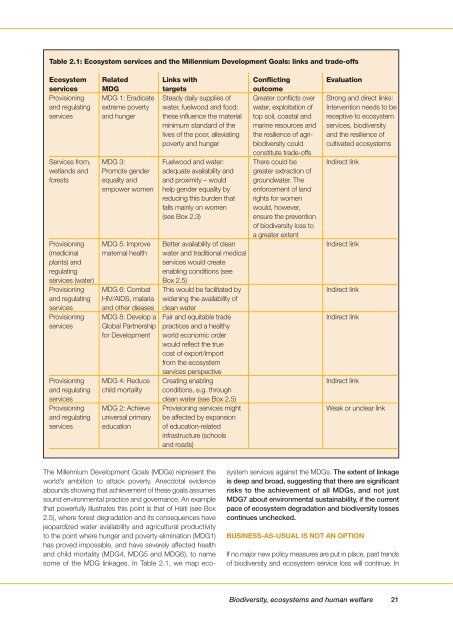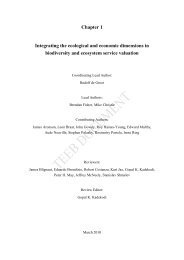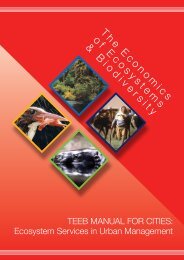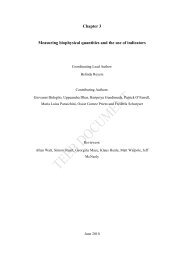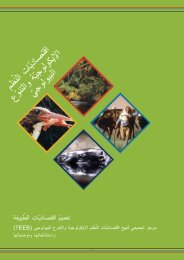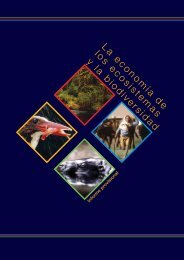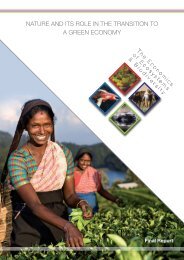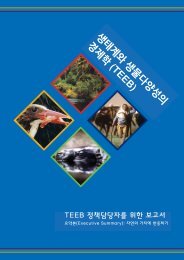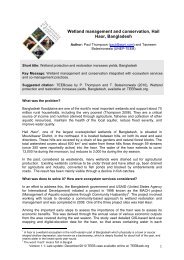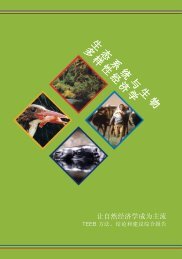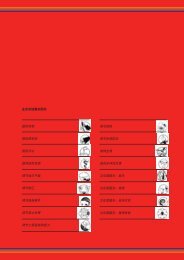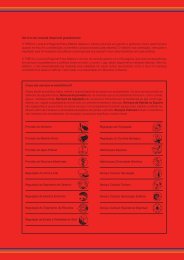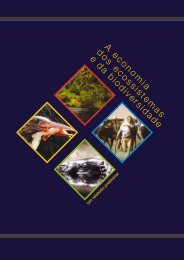Interim Report - TEEB
Interim Report - TEEB
Interim Report - TEEB
Create successful ePaper yourself
Turn your PDF publications into a flip-book with our unique Google optimized e-Paper software.
Table 2.1: Ecosystem services and the Millennium Development Goals: links and trade-offs<br />
Ecosystem Related Links with Conflicting Evaluation<br />
services MDG targets outcome<br />
Provisioning MDG 1: Eradicate Steady daily supplies of Greater conflicts over Strong and direct links:<br />
and regulating extreme poverty water, fuelwood and food: water, exploitation of Intervention needs to be<br />
services and hunger these influence the material top soil, coastal and receptive to ecosystem<br />
minimum standard of the marine resources and services, biodiversity<br />
lives of the poor, alleviating the resilience of agri- and the resilience of<br />
poverty and hunger biodiversity could cultivated ecosystems<br />
constitute trade-offs<br />
Services from, MDG 3: Fuelwood and water: There could be Indirect link<br />
wetlands and Promote gender adequate availability and greater extraction of<br />
forests equality and and proximity – would groundwater. The<br />
empower women help gender equality by enforcement of land<br />
reducing this burden that rights for women<br />
falls mainly on women would, however,<br />
(see Box 2.3)<br />
ensure the prevention<br />
of biodiversity loss to<br />
a greater extent<br />
Provisioning MDG 5: Improve Better availability of clean Indirect link<br />
(medicinal maternal health water and traditional medical<br />
plants) and<br />
services would create<br />
regulating<br />
enabling conditions (see<br />
services (water) Box 2.5)<br />
Provisioning MDG 6: Combat This would be facilitated by Indirect link<br />
and regulating HIV/AIDS, malaria widening the availability of<br />
services and other dieases clean water<br />
Provisioning MDG 8: Develop a Fair and equitable trade Indirect link<br />
services Global Partnership practices and a healthy<br />
for Development world economic order<br />
would reflect the true<br />
cost of export/import<br />
from the ecosystem<br />
services perspective<br />
Provisioning MDG 4: Reduce Creating enabling Indirect link<br />
and regulating child mortality conditions, e.g. through<br />
services clean water (see Box 2.5)<br />
Provisioning MDG 2: Achieve Provisioning services might Weak or unclear link<br />
and regulating universal primary be affected by expansion<br />
services education of education-related<br />
infrastructure (schools<br />
and roads)<br />
The Millennium Development Goals (MDGs) represent the<br />
world’s ambition to attack poverty. Anecdotal evidence<br />
abounds showing that achievement of these goals assumes<br />
sound environmental practice and governance. An example<br />
that powerfully illustrates this point is that of Haiti (see Box<br />
2.5), where forest degradation and its consequences have<br />
jeopardized water availability and agricultural productivity<br />
to the point where hunger and poverty elimination (MDG1)<br />
has proved impossible, and have severely affected health<br />
and child mortality (MDG4, MDG5 and MDG6), to name<br />
some of the MDG linkages. In Table 2.1, we map ecosystem<br />
services against the MDGs. The extent of linkage<br />
is deep and broad, suggesting that there are significant<br />
risks to the achievement of all MDGs, and not just<br />
MDG7 about environmental sustainability, if the current<br />
pace of ecosystem degradation and biodiversity losses<br />
continues unchecked.<br />
BUSINESS-AS-USUAL IS NOT AN OPTION<br />
If no major new policy measures are put in place, past trends<br />
of biodiversity and ecosystem service loss will continue. In<br />
Biodiversity, ecosystems and human welfare<br />
21


